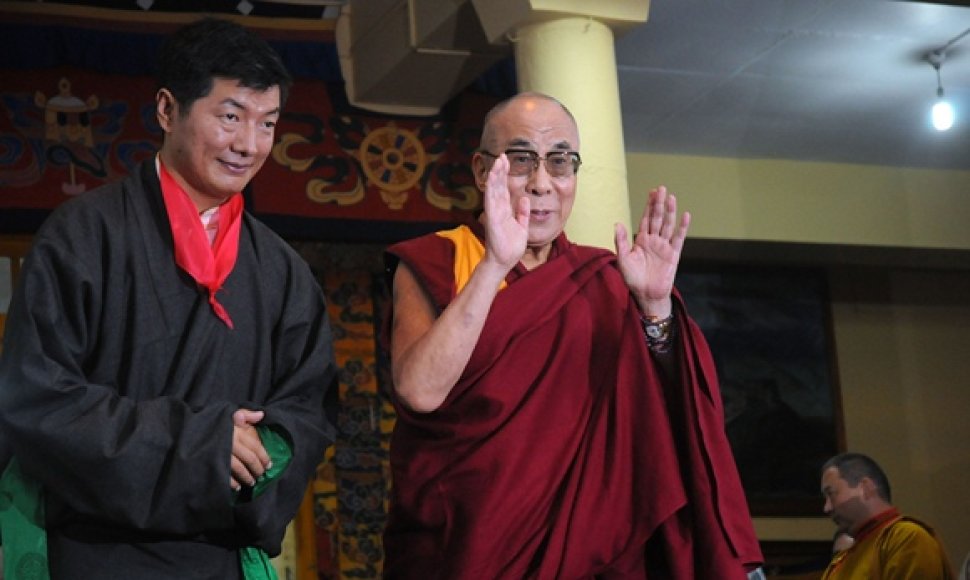The roar of cannon fire resounds throughout the halls of the Seimas, the Lithuanian Parliament, as every single person inside stands still and quiet:. a minute of silence to honour the sacrifice of those who fell in service of Lithuania and Tibet in the past.
Sikyong Dr Lobsang Sangay addresses a crowd of listeners – politicians, press members, and people of curiosity – about the plight of Tibet and the rough road towards independence. “It is karmic coincidence,” Sangay begins, “that I happened to be here on June the 14th: it is a day of solidarity. I am in solidarity with the people of Lithuania.”
Sangay refers to the Soviet occupation of Lithuania over half a century ago and draws a parallel between the past of the Baltic States and the current situation in Tibet. Concerning the 119 recorded self-immolations, Sangay comments that they are “leaving this world, because the suffering of Tibet is unbearable.”
“We want the same piece of the Dalai Lama that you get,” he states, alluding to His Holiness’ visit to Lithuania in September of this year. Sangay draws attention to how Tibetans want to enjoy the same freedoms and to follow their religious leader just as much as (if not more so than) other countries.
“What’s the basis to think that Tibet will regain its independence? It happened to the Baltic States, it will happen to us.” Sangay’s firm belief in a better future for his nation is linked to historic examples, namely, the fall of the USSR.
“Tibetans cannot offer you anything material,” he points out, fully aware that the people in the audience are more concerned with promoting humanity and dignity than forms of financial extravagance.
We all want to do business with China, but human rights are equally important… they are the basis on which Lithuania was founded.
“You are true friends of Tibet in our time of need,” Sangay shows his appreciation for the support Lithuania has provided and plans to give in the near future.
Leonidas Donskis, a Lithuanian member of the European Parliament, talks about how the modern world no longer has any space for countries advocating colonial mindset. Russia and China, in his opinion, have lost all moral credibility for their regimes.
“How long can we wait, watching these atrocities in front of our eyes, without doing anything?” he ponders. Donskis states that market economy does not necessarily lead to democracy: it is time to do away with Realpolitik and openly declare that human rights violations should not and must not occur.
Freedom, national self-determination, dignity – these are the principles that should govern how the world functions.
Thubten Samdup, His Holiness the 14th Dalai Lama’s representative for Northern Europe and the Baltic States, notes that “the support we had here [in the Baltic States] was real – I could feel it.” He optimistically says that he is glad “there are people in this world that still care about justice and truth.”
However, he says that it is time to act. Sympathy is no longer enough, because “everybody wants the Dalai Lama, but they don’t want to touch Tibet.” Tangible support is what Tibet needs. Samdup implored the audience to show their dedication to the cause by working towards supporting Tibet in the context of the European Union.
“For the sake of humanity”, he gives the reason: the international community would forsake the principles they officially adore, if Tibet is ignored.
Sangay then draws attention to how Europe, as a whole, has the power to influence China’s decisions: “You are the market, you are the customer.”
“We all want to do business with China, but human rights are equally important… they are the basis on which Lithuania was founded,” he reminds the crowd. Greed has to be suppressed and solidarity needs to come to the forefront once more: the question is no longer one solely about Tibet, but one about the type of world we want to live in.
Donskis finishes the discussion by promising to do everything in his power as a member of the European Parliament to create the position of a European Union Representative to Tibet.
The fate of Tibet heavily rests on what the leaders of Lithuania do in the coming months: whether or not they decide to move from sympathy to full-fledged support depends on what values every human being sees as being of utmost importance.












